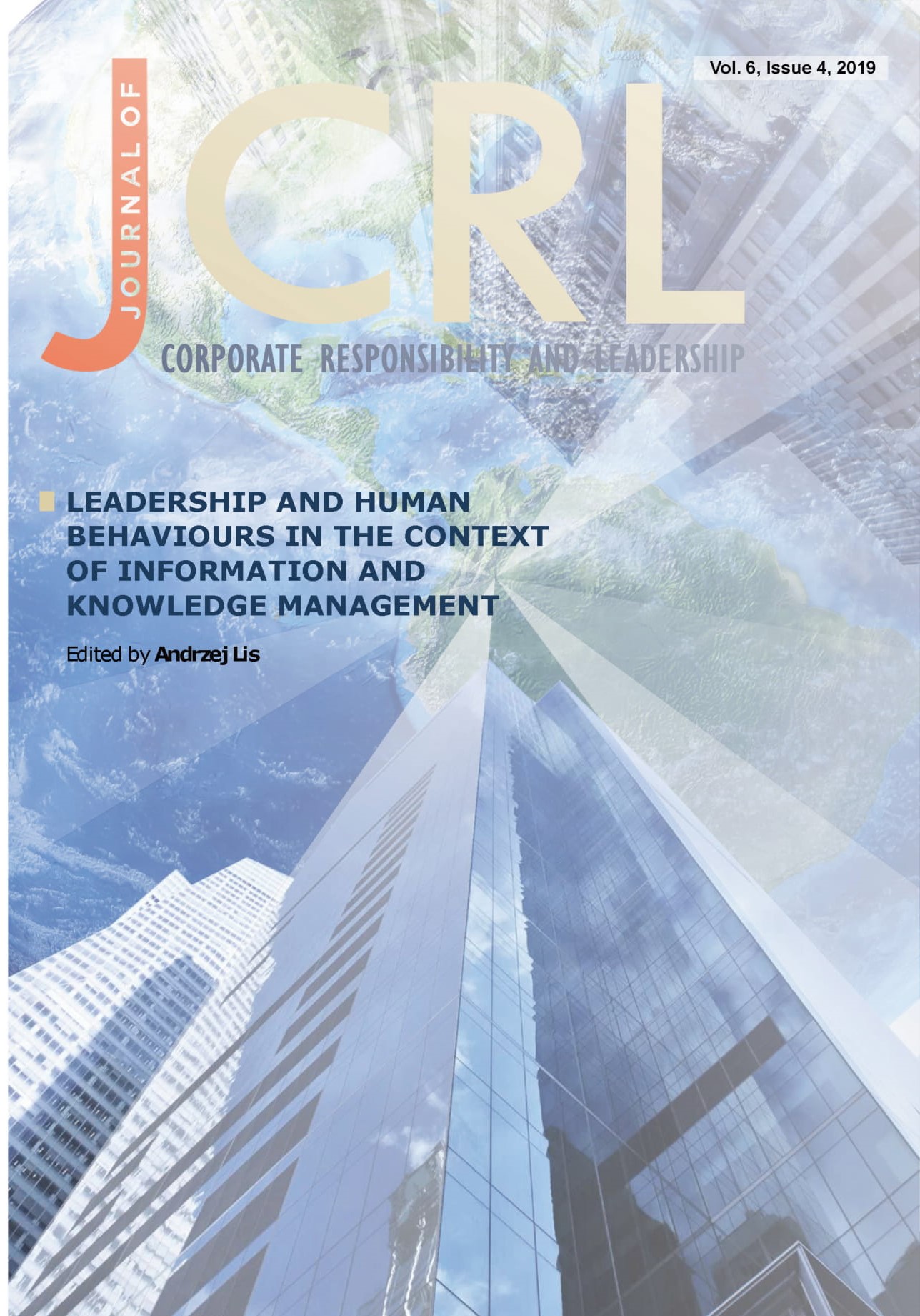Self-leadership and Growth Mindset as Mutually Supportive Determinants of Behaviors
DOI:
https://doi.org/10.12775/JCRL.2019.014Keywords
self-leadership, growth mindset, determinants of behaviorsAbstract
Purpose: This article is focused on checking whether there is an interdependence between the levels of self-leadership and growth mindset presented by an individual and whether these factors affect the functioning of employees.
Methodology: The respondents were an open group of 237 participants of different age, job seniority and position. The following questionnaires were used in the study: ASQL by Houghton, Dawley and DiLiello – to measure the level of self-leadership, and NNR by Godlewska-Werner – to measure the level of growth mindset.
Findings: The results of the study show that self-leadership and growth mindset are factors that significantly affect each other. However, there are no relationships between the overall level of self-leadership and: age, sex,
job seniority or holding managerial positions.
Research and practical implications: Research can be important to management practice in team building processes as the level of selfleadership can be a relevant factor which promoted and shared among coworkers allows to create a more balanced, engaging work environment for managers and those they lead. Originality/value: The research conducted so far has focused on the analysis of the connections between growth mindset and leadership. This research shows that growth mindset also affects the level of selfleadership, and thus individuals’ attitude to aspects such as: making the effort, accepting feedback or the success of co-workers.
Paper type: research paper
References
Boaler, J. (2013). Ability and mathematics: The mindset revolution that is reshaping education. Forum, 55(1), 143–152.
Caniëls, M. C., Semeijn, J. H., & Renders, I. H. (2018). Mind the mindset! The interaction of proactive personality, transformational leadership and growth
mindset for engagement at work. Career Development International, 23(1), 48–66.
Driskell, J.E., Copper, C. & Moran, A. (1994). Does mental practice enhance performance?, Journal of Applied Psychology, 79, 481–492.
Dweck, C. S. (2008). Mindset: The New Psychology of Success. Random House Digital, Inc.
Dweck, C. S. (2009). Mindsets: Developing talent through a growth mindset. Olympic Coach, 21(1), 4–7.
Golby, J., & Wood, P. (2016). The effects of psychological skills training on mental toughness and psychological well-being of student-athletes. Psychology, 7(6), 901–913.
Hooker, C., & Csikszentmihalyi, M. (2003). Flow, creativity, and shared leadership: Rethinking the motivation and structuring of knowledge work. In Pearce, C. L. & Conger, J. A. (Eds.), Shared Leadership: Reframing the Hows and Whys of Leadership. SAGE Publications.
Houghton, J. D., Dawley, D., & DiLiello, T. C. (2012). The abbreviated self-leadership questionnaire (ASLQ): A more concise measure of self-leadership. International
Journal of Leadership Studies, 7(2), 216–232.
Hwang, Y. K., & Lee, C. S. (2020). Relationship between body image, growth mindset, grit, and successful aging in Korean elderly: Moderated mediation effect of hope. Medico Legal Update, 20(1), 2196–2202.
Lee, C. S. (2018). Authentic leadership and organizational effectiveness: The roles of hope, grit, and growth mindset. International Journal of Pure and Applied Mathematics, 118(19), 383–401.
Manz, C. C. (1986). Self-leadership: Toward an expanded theory of self-influence processes in organizations. Academy of Management Review, 11(3), 585–600.
Manz, C. C., & Neck, C. P. (2004). Mastering Self-Leadership: Empowering Yourself for Personal Excellence. Upper Saddle River, NJ: Pearson Prentice-Hall.
Manz, C. C., & Sims, H. P. Jr (1989). Superleadership: Leading Others to Lead Themselves. Englewood Cliffs, NJ: Prentice-Hall.
Manz, C. C., & Sims, H. P. Jr (2001). New uperleadership: Leading Others to Lead Themselves. San Francisco, CA: Berrett-Koehler.
Neck, C. P., & Houghton, J. D. (2006). Two decades of self‐leadership theory and research. Journal of Managerial Psychology, 21(4), 270–295.
Norris, S. E. (2008). An examination of self-leadership. Emerging Leadership Journeys, 1(2), 43–61.
Prussia, G. E., Anderson, J. S., & Manz, C. C. (1998). Self-leadership and performance outcomes: The mediating influence of self-efficacy. Journal of Organizational Behavior, 19, 523–538.
Rad, A. M. M., & Yarmohammadian, M. H. (2006). A study of relationship between managers’ leadership style and employees’ job satisfaction. Leadership in Health Services, 19(2), 11–28.
Stewart, G. L., Courtright, S. H., & Manz, C. C. (2011). Self-leadership: A multilevel review. Journal of Management, 37(1), 185–222.
Downloads
Published
How to Cite
Issue
Section
Stats
Number of views and downloads: 1115
Number of citations: 0



